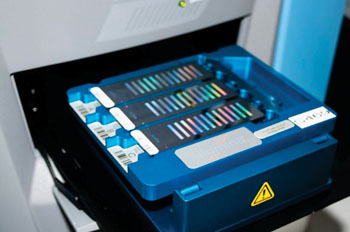Blood Test Developed to Indicate Breast Cancer Risk
By LabMedica International staff writers
Posted on 10 Jul 2014
A simple blood test to help predict the likelihood of a woman developing breast cancer has been developed, as the idea that genetic mutations are the sole contributors to the development of the disease is changing.Posted on 10 Jul 2014
Extensive genome-wide association studies have identified a number of single nucleotide polymorphisms (SNPs) associated with breast cancer risk whereas a gene mutation associated DNA methylation signature in blood cells could predict sporadic breast cancer incidence and survival.

Image: Illumina’s Infinium Human Methylation BeadChip Kits (Photo Courtesy of University of Munster).
Scientists at the University College London (UK) and their colleagues analyzed whole blood samples from two cohorts of breast cancer 1, early onset (BRCA1) gene mutation carriers and controls without a BRCA1 mutation. A total of 152 women, 75 cancer cases and 77 controls, were selected from those who provided both a peripheral blood and a buccal cell sample at the age of 53 in 1999, who had not previously developed any cancer.
The DNA from whole blood and tissues was extracted and DNA methylation analysis was performed using the validated Infinium Human Methylation BeadChip (Illumina; San Diego, CA, USA) or Illumina’s Infinium Human Methylation450 BeadChip kit. The methylation status of a specific CpG site, where a cytosine nucleotide occurs next to a guanine nucleotide, was calculated from the intensity of the methylated (M) and unmethylated (U) alleles, as the ratio of fluorescent signals.
The team analyzed DNA methylation (DNAme) of 27,578 CpGs in white blood cell (WBC) samples from a total of 72 women with a known BRCA1 mutation and 72 women with no mutation in the BRCA1 or BRCA2 gene. The scientists found that the women who developed both hereditary and non-hereditary breast cancer shared the same signature. The investigators believe that the epigenetic signature may be responsible for silencing genes in immune cells and if these genes are silenced, then the immune system may be less able to prevent the development of breast cancer.
Martin Widschwendter, MD, a professor of Gynecological Oncology and lead author of the study, said, “We identified an epigenetic signature in women with a mutated BRCA1 gene that was linked to increased cancer risk and lower survival rates. Surprisingly, we found the same signature in large cohorts of women without the BRCA1 mutation and it was able to predict breast cancer risk several years before diagnosis. The data is encouraging since it shows the potential of a blood-based epigenetic test to identify breast cancer risk in women without known predisposing genetic mutations.” The study was published on June 27, 2014, in the journal Genome Medicine.
Related Links:
University College London
Illumina













